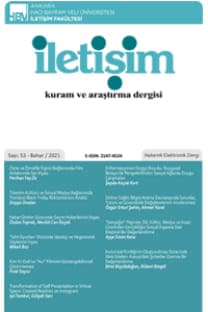Fikri mülkiyet haklarının gelişimini iletişim teknolojileri örneğinde değerlendirmek
Evaluating the development of intellectual property rights in the scope of communication technologies
___
- Breakey, H. (2009) “Liberalism and Intellectual Property Rights”, Politics, Philosopy & Economics, 8 (3), p. 329-349.
- Danowski, J. A. ve Park, D. W. (2009) “Networks of the Dead or Alive in Cyberspace: Public Intellectuals in the Mass and Internet Media”, New Media & Society, 11 (3), p. 337-356.
- Devlet Planlama Teşkilatı (DPT) (2007) “Fikri Mülkiyet Hakları”, Özel İhtisas Komisyonu Raporu, Dokuzuncu Kalkınma Planı 2007-2013, Ankara.
- Garmon, C. W. (2002) “Intellectual Property Rights: Protecting the Creation of New Knowledge Across Cultural Boundaries”, American Behavioral Scientist, 45 (7), p. 1145–1158.
- Gelir İdaresi Başkanlığı (GİB) (2009) GATT Bilgilendirme Rehberi, Ankara: Gelir İdaresi Başkanlığı GATT Müdürlüğü Yayınları.
- Geray, H. (2002) İletişim ve Teknoloji, Ankara: Ütopya.
- Greasley, D. ve Oxley, L. (2007) “Patenting, Intellectual Property Rights and Sectoral Outputs in Industrial Revolution Britain, 1780–1851”, Journal of Econometrics, No: 139, p. 340–354.
- IWS (2010) “World Internet Usage and Population Statistics”, http://www.internetworldstats.com/stats.htm [Erişim Tarihi: 24.02.2010].
- Kretschmer, M. (2005) “Trends in Global Copyright”, Global Media and Communication, 1 (2), p. 231-237.
- Mahon, B. (2000) “The Intellectual Property Industries and the New Tech World”, Business Information Review, 17 (4), p. 185-190.
- Manion, H. K. (2005) “A Global Perspective on Intellectual Property Rights: A Social Work View”, International Social Work, 48 (1), p. 77-87.
- Moore, A. D. (2008) “Personality-Based, Rule-Utilitarian, and Lockean Justifications of Intellectual Property”, p. 105-130, in The Handbook of Information and Computer Ethics, (eds.) Kenneth E. Himma ve Herman T. Tavani, New Jersey: John Wiley & Sons.
- Muir, A. ve Oppenheim, C. (2002) “National Information Policy Developments Worldwide IV: Copyright, Freedom of Information and Data Protection”, Journal of Information Science, 28 (6), p. 467-481.
- Naghavi, A. (2007) “Strategic Intellectual Property Rights Policy and North-South Technology Transfer”, Review of World Economics, 143 (1), p. 55-78.
- Nicholson, M. W. (2007) “The Impact of Industry Characteristics and IPR Policy on Foreign Direct Investment”, Review of World Economics, 143 (1), p. 27-54.
- Peters, M. (1998) “The Challenge of Copyright in the Digital Age”, Economic Perspectives, Vol. 3 No: 3, p. 9-13.
- Pugatch, M. P. (2004) Political Economy of Intellectual Property Rights: New Horizons in Intellectual Property. Cheltenham: Edward Elgar Publishing.
- Rikowski, R. (2003) “TRIPS Into the Unknown: Libraries and the WTO Agreement on Trade-Related Aspects of Intellectual Property Rights”, IFLA Journal, 29 (2), p. 141-151.
- Yüksel, M. (2001a) “Fikri Mülkiyete İlişkin Felsefi Tartışmalar”, Kültür ve İletişim,Kış, 4 (1), s. 87-108.
- Yüksel, M. (2001b) Küreselleşme, Ulusal Hukuk ve Türkiye, Ankara: Siyasal Kitabevi Yayınları.
- Yayın Aralığı: 3
- Başlangıç: 1983
- Yayıncı: Ankara Hacı Bayram Veli Üniversitesi İletişim Fakültesi
Aile içi şiddet ve medya: Gündüz kuşağı televizyonunda şiddetin görünürlüğü ve yeniden üretimi
İletişim araştırmaları ve arşiv
Gazetelerde ötekileştirme pratikleri: Türk basını üzerine bir inceleme
BEZİRGAN. Yurdagül ARAR, Nuri BİLGİN
Pazarlama iletişiminde motivasyonun önemi ve çok uluslu alışveriş merkezi örneği
Bünyamin AYHAN, Hüsamettin AKAR, Şükrü BALCI
Siyasal iletişim bağlamında bir biyografi çalışması: Mehmet Akif Ersoy
Yeni Tayvan sineması: Hüzün Şehri'ne ( BEİ QİNG CHENG SHİ ) Genel bir bakış
